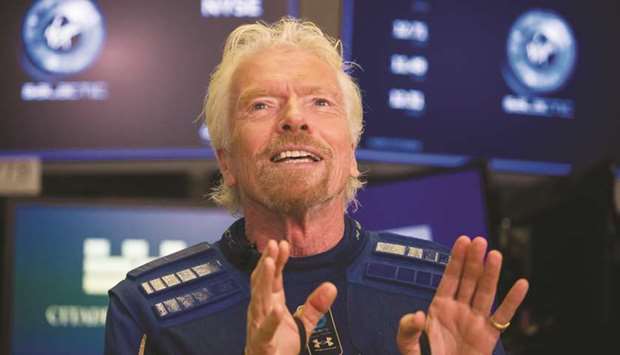Richard Branson is considering pouring more money into teetering Virgin Atlantic Airways Ltd than he originally pledged in a bid to attract outside investors and gain access to hundreds of millions of pounds of state-backed loans, according to people familiar with the matter.
Branson had earlier said he’d channel the bulk of a $250mn infusion into his Virgin-branded companies toward the UK airline.
The pledge, linked to a request for some £500mn ($618mn) in UK funding guarantees, has met with resistance from the government.
The talks and amounts are in flux, the people said.
US partner Delta Air Lines Inc has said it won’t put in more money, and raised the possibility that Virgin Atlantic could go through insolvency proceedings.
Branson has been pursuing outside investors to strengthen the bailout application.
The 69-year-old billionaire’s Virgin Group is seeking some combination of structured finance, convertible bonds or preferred debt, according to one of the people, who asked not to be named discussing a confidential matter.
An injection of pure equity could also be part of the mix, though rules governing airline ownership could place limits on that option.
About 100 financial investors have been contacted with around half responding, the person said.
Branson himself “has no intention of selling out” of Virgin Atlantic, Nick Fox, a spokesman for Virgin Group, said by phone.
He declined to comment on the investor search or what form support might take.
Virgin previously confirmed that Houlihan Lokey had been engaged to lead the search. The future of Branson’s flagship business is on the line as airlines worldwide are roiled by the Covid-19 outbreak.
Like other European carriers, Virgin Atlantic has grounded almost all of the fleet, while slashing costs through a deal with staff to take unpaid leave.
That step and question marks over Branson’s tax affairs have led to a backlash against a bailout from some UK politicians.
His Virgin Australia was already denied a rescue and faces collapse. Branson, who founded the airline in 1984 and owns a 51% stake, would remain a leading shareholder, the people said.
Delta’s 49% stake would likely go down.
Britain’s Telegraph newspaper reported earlier that Branson was seeking a buyer for Virgin Atlantic, something his spokesman disputed.
“Richard is committed to investing in Virgin Atlantic,” Fox said. “He and Virgin Group are fully supportive of the process the airline is going through in seeking prospective investors.”
With the airline industry in such dire straits, a new backer would be investing on the strength of Branson’s plans for the carrier, one person said.
The tycoon last year came close to selling 30% of Virgin Atlantic to ally Air France-KLM before pulling the plan as earnings surged.
While Virgin Atlantic and its adviser have reached out to potential investors including private equity firms and sovereign wealth funds to gauge interest, some have been reluctant to risk putting money into the battered airline sector, two people said.
Among investment options, Crawley, England-based Virgin Atlantic could issue bonds convertible into stock after five years if not repaid, one person said.
The institutions expressing an interest in Virgin will be provided with insight into two- and five-year plans for the airline after signing non-disclosure agreements, according to another person.
While Delta won’t provide direct investment while itself seeking federal funding, the US carrier may be able to help indirectly in the longer term.
That could include deferring payments related to a joint venture between the airlines and others for a booking platform, one of the people said.
Branson has already said he’s seeking to raise cash against his Necker Island home in the British Virgin Islands.
Most of that money will likely go to help his other leisure businesses, the person said.
The search for an new investor may be complicated by airline ownership rules, which dictate that a carrier must be majority owned in the location where it holds its air operating certificate.
That could affect how much funding is structured as equity versus debt, and affect the airline’s ownership structure.

Richard Branson, founder of Virgin Group, speaks during an interview in New York. Branson himself u201chas no intention of selling outu201d of Virgin Atlantic, Nick Fox, a spokesman for Virgin Group, said.
